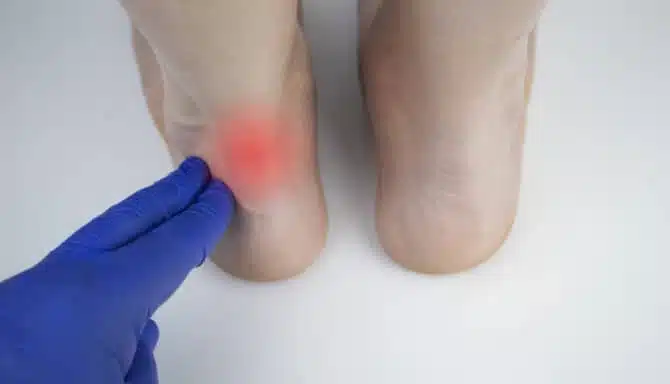Gut Inflammation and Foot Pain – What’s the Link?
Foot pain is often blamed on overuse or injury—but new research highlights a less obvious cause: gut health. Specifically, gut inflammation and foot pain are more connected than you might expect. When the gut lining becomes compromised, harmful particles can leak into the bloodstream, triggering systemic inflammation.
This inflammation may impact muscles, joints, and soft tissues—especially in the feet, where stress is frequent.
Systemic Inflammation and Plantar Fasciitis
One of the most common causes of heel pain, plantar fasciitis, is already driven by inflammation. But when systemic inflammation is present due to poor gut health, it can make symptoms worse and recovery slower.
People with inflammatory diseases like rheumatoid arthritis or inflammatory bowel disease often experience foot pain, suggesting a deeper, whole-body link. Reducing systemic inflammation through gut care may provide relief for conditions like plantar fasciitis.
Gut Microbiome and Joint Health in the Feet

The gut microbiome—the complex ecosystem of bacteria in your digestive tract—plays a critical role in regulating inflammation and immune response. When the microbiome is imbalanced (a condition known as dysbiosis), inflammation can increase, affecting joint health across the body, including in the feet and ankles.
Emerging studies show a strong connection between gut microbiome and joint health, indicating that good gut bacteria may help reduce chronic foot pain linked to inflammation.
Nutrient Absorption: A Key to Musculoskeletal Foot Health
Beyond inflammation, poor gut health also affects how your body absorbs nutrients, such as:
- Vitamin D
- Magnesium
- Omega-3 fatty acids
These nutrients are essential for maintaining strong bones, muscles, and connective tissues. A gut that’s not absorbing nutrients efficiently could contribute to foot fatigue, pain, or slow injury recovery.
How to Support Gut Health for Better Foot Health

If you’re dealing with persistent foot pain—especially conditions like plantar fasciitis—supporting your gut could be a game changer. Here are some steps to consider:
- Adopt an anti-inflammatory diet: Reduce processed foods, sugar, and excess alcohol.
- Add probiotics and fiber: These help maintain a balanced gut microbiome.
- Stay hydrated and active: Movement supports both gut motility and foot health.
- Get tested: A healthcare provider can check for nutrient deficiencies or inflammatory markers.
By improving your gut health, you may also be reducing the underlying inflammation contributing to your foot issues.
When to See a Chiropodist
Foot pain shouldn’t be ignored. If your discomfort persists despite footwear changes or home remedies, a professional assessment is key. At Feet First Clinic, we look at the bigger picture—including possible systemic factors like gut health that may be influencing your pain.
Final Thoughts on Gut Health and Foot Pain
The body is more interconnected than we often realize. Research on gut inflammation and foot pain, systemic inflammation and plantar fasciitis, and the gut microbiome’s role in joint health is still growing—but one thing is clear: taking care of your gut may help your feet feel better too.










